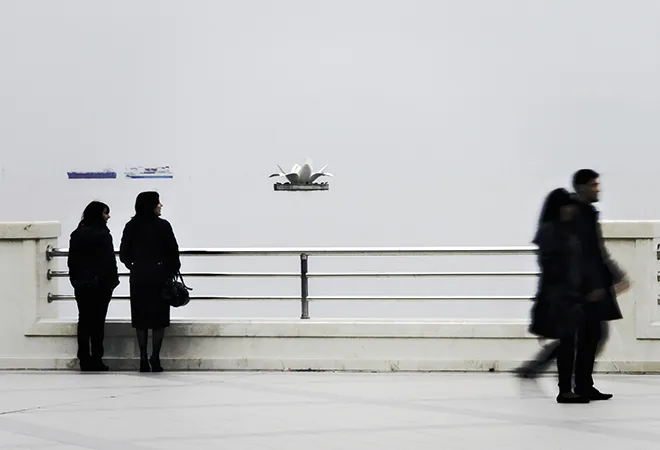-
CENTRES
Progammes & Centres
Location
‘Wheat diplomacy’ could just be the start of focus on export from India to Afghanistan.

On creating walls between neighbours, Robert Frost had brilliantly summarised in his poetic masterpiece ‘Mending Wall’ saying:
Something there is that doesn't love a wall,
That sends the frozen-ground-swell under it,
…
The gaps I mean,
No one has seen them made or heard them made,
But at spring mending-time we find them there.
I let my neighbour know beyond the hill
For neighbours sharing long borders and cultures (with one of the countries being landlocked), seamless and growing trade between them is a foregone conclusion. Or is it? Not when artificial walls are erected time and again, leading to acrimony and distaste. And when the metaphorical gaps are found, albeit with other neighbours, the wall ironically penalises its original mason in a fast shrinking and nimble world.
Over the last 15 years, Pakistan has closed its border on multiple instances with Afghanistan, adding to the sheer unreliability of the trade permissibility on the Af-Pak border. For bilateral trade that peaked close to USD 3 billion in 2011, the estimates for the current year are less than 1 billion between the two countries. The border trade blockades, put up by Pakistan, have ostensibly been a penalising chip to reign in political and security behaviour in Afghanistan. Whether this bargaining chip has yielded any positive outcome in Afghanistan can be debated, but it surely has pushed Afghanistan in seeking other trade partners, successfully. A decline of bilateral trade by 70% over a decade between Pakistan and Afghanistan has been comfortably filled in the other neighbours in Central and South Asia.
Take wheat, for example. In 2006, Afghanistan imported more than 50% of its wheat and flour requirements from Pakistan, but that lead position has now been taken by Kazakhstan. Estimates show that more than 800 flour mills have been closed in Pakistan due to a decline in exports to Afghanistan, especially in the Khyber-Pakhtunwa region bordering Afghanistan. Pakistan currently has stocked 9.7 million tonnes of wheat, but isn’t able to export it for lack of a clear policy (the Afghanistan-Pakistan Transit Trade Treaty, which is pending re-negotiation, under revised terms). Given storage infrastructure limitations, majority of this wheat is lying in open storage. In four months, the new wheat season starts, compounding the economic woes and another difficult year for the wheat farmer in Pakistan. The last year saw four border blockages by Pakistan, and steep decline of about 26 per cent in its exports to Afghanistan in the same period seem to have strong correlation. Any attempts to fuel inflation or trigger a humanitarian crisis in Afghanistan have clearly backfired.
India, in a first, sent across its first shipment of wheat in October this year (through the strategically located Chabahar port in Iran), the first in a series of six shipments totalling 1.1 million tonnes of wheat, on a grant basis.
Sensing ‘wheat diplomacy’ as the apt symbolism for a nation which had been denied import, it could just be the start of focus on export from India to Afghanistan. Though India is Afghanistan’s top export destination (in 2016, USD 220 million of Afghanistan’s USD 483 million in total trade went to India, which accounted for 46 per cent of Afghan exports), India is a minor player in exports to Afghanistan, having accounted for just 2.0 per cent of Afghanistan’s total imports in 2016.
India has continued expanding its reconstruction footprint in Afghanistan; the building of the Salma dam in western Afghanistan and the Afghan Parliament House in addition to the building of roads and railways, has earned India substantial goodwill in the nation. India’s largest foreign aid is reserved for Afghanistan, apart from the training of its civil servants and security forces.
Though the aid and humanitarian assistance from India is forthcoming, the border blockades and other myopic measures by Pakistan along the Af-Pak give India a unique opportunity to capitalise on growing exports from current levels and embarking upon a new era of trade diplomacy with Afghanistan.
The views expressed above belong to the author(s). ORF research and analyses now available on Telegram! Click here to access our curated content — blogs, longforms and interviews.

Avijit Goel is a Senior Director with Flipkart. An alumnus of the Oxford University
Read More +